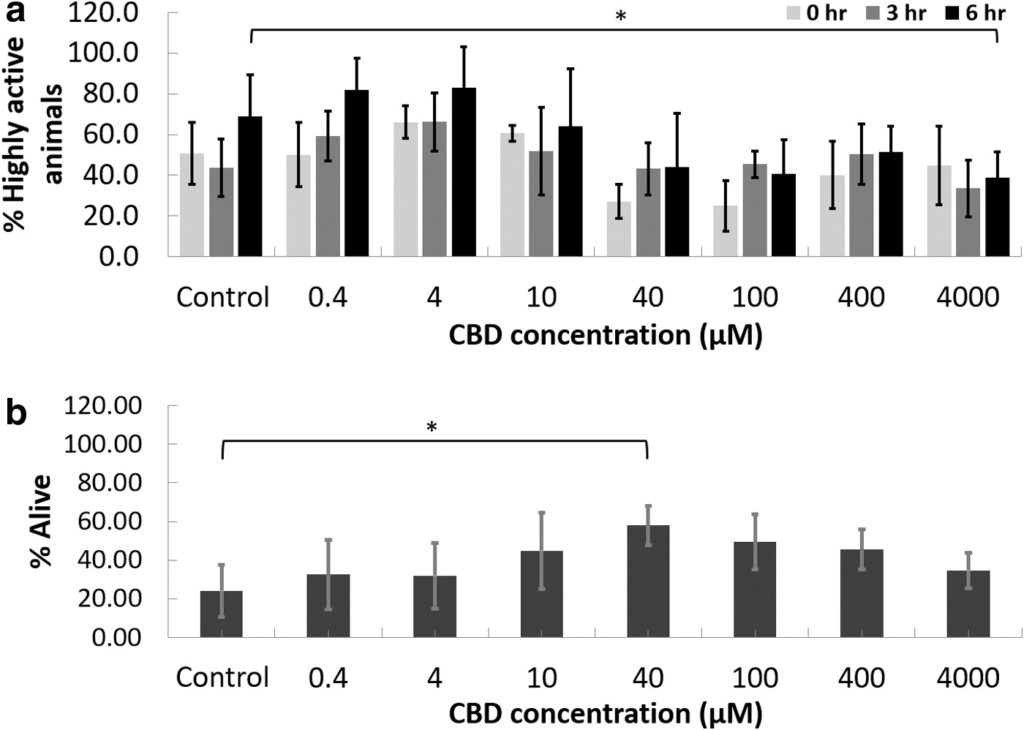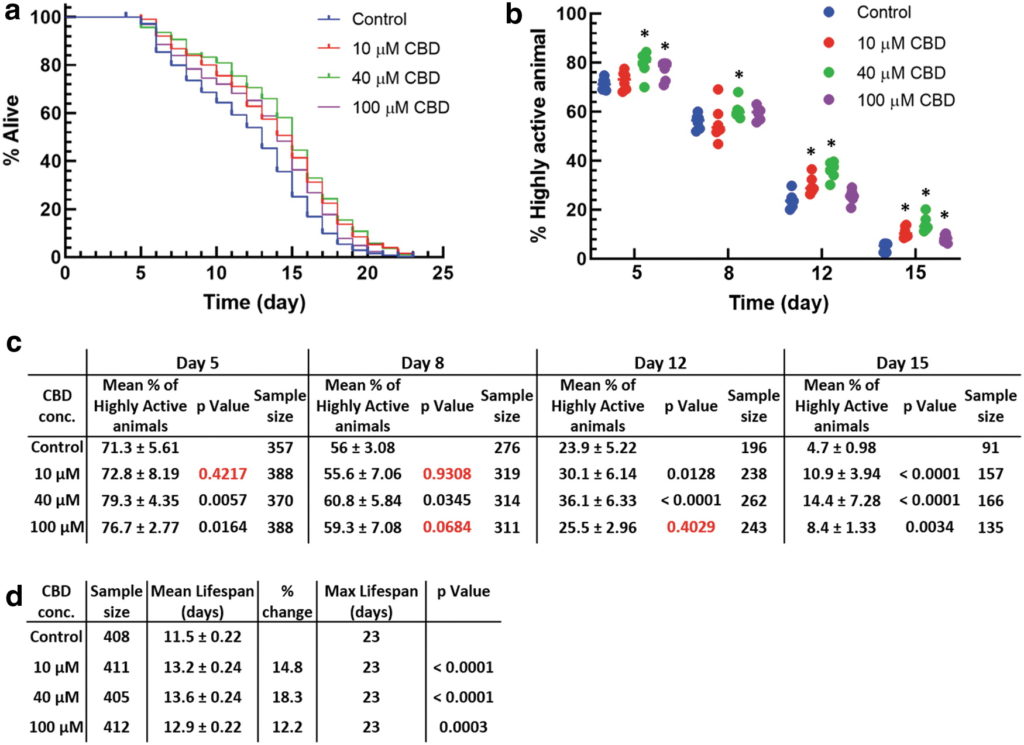
With the spotlight on cannabidiol (CBD) and CBD products, a lot of questions are being raised about its long-term effects.
Some believe CBD is the ultimate treatment for a number of different health symptoms, while others are more than happy to turn their noses up and kick it to the curb. Unfortunately, if you’re in the latter group, you’ve done yourself and the CBD industry a misjustice.
Even though cannabis research is still in relative infancy (for the most part), a new compelling study has just been released by a major cannabis production and research company showcasing CBD’s long-term effects.
The results are surprising.
TL;DR
- Canopy Growth is a prolific cannabis producer, researcher, and product innovator — once the largest cannabis company in the world (2019)
- Canopy Growth and its medical division (Spectrum Therapeutics) undertook a compelling study on the long-term effects of CBD — the first of its kind
- Humans weren’t used in this study, a special group of worms were instead (Caenorhabditis elegans) — transparent bodies, 60-80% genetic similarity with humans, same physiological mechanisms as humans, short lifespan
- Interesting results — no toxicity, no premature deaths, extended lifespan, increased activity and motility in later life from CBD use
- Other effects and benefits include CBD for anxiety, CBD for pain, and CBD for epilepsy
- Common side-effects of CBD include dizziness, fatigue, headaches, stomach complaints
- CBD can have an effect on certain medications due to inhibiting the same liver enzymes that metabolize drugs and intoxicants
Who is Canopy Growth?
Canopy Growth (formerly known as Tweed Marijuana Inc.) is a prolific cannabis producer, researcher, and product innovation company based in Smith Falls, Ontario, Canada. The company began in 2013 and was the first federally regulated and licensed cannabis producer to be publicly-traded in the United States under the name WEED.
Originally, Canopy Growth’s entire operation was based in Canada. As of 2020, the company has business partnerships and subsidiaries all over the globe.
Partnerships include:
- Alcaliber S.A.
- Constellation Brands
- Spectrum Cannabis Denmark ApS
- Beckley Foundation
Subsidiaries include:
- Tweed Marijuana
- Tweed Farms
- Bedrocan Canada
- Spektrum Cannabis GmbH
- Annabis Medical
In 2019, Canopy Growth was known as the largest cannabis company in the world.
What we know about Canopy Growth’s study on CBD’s long-term effects
Canopy Growth’s study is one of a kind, but the company didn’t do it alone. Spectrum Therapeutics, Canopy Growth’s medical division, was enlisted to provide professional, specialized expertise, ensuring the highest-quality study conditions.
Who is Spectrum Therapeutics?
As mentioned, Spectrum Therapeutics is Canopy Growth’s own medical division based in Denmark. The company specializes in medical cannabis education and research.
As of 2019, Spectrum Therapeutics became the first approved cannabis company to produce medical cannabis in Denmark.
What was the aim of the study?
The aim of this study was to evaluate and determine CBD’s long-term effects on humans. The team looked at potential acute toxicity, stability, solubility, and thermotolerance of CBD, as well as how it may shorten an individual’s lifespan.
Interestingly, humans weren’t tested on. This would, in theory, take 50-70 years to complete in the real world. Instead, a unique type of worm was used as a test subject.
Why did the research team use worm test subjects?
The worms used in this study are special. Scientifically known as nematode Caenorhabditis elegans (C. elegans), they’re roughly 0.5-2.5 mm long (some reaching up to 2 inches) and totally transparent.
The reasons why they’re now commonly used for lifelong drug-exposure toxicity research (preclinical mostly) are:
- The aforementioned transparency at all stages of their life
- Short lifespan (2-3 weeks)
- 60-80% genetic similarity to humans
- Metabolically active reproductive, digestive, endocrine, sensory, and neuromuscular systems
Due to physiological, biological, and genetic similarities to humans, as well as having short lifespans, researchers are able to understand toxicity in mammals quickly via C. elegans.
What did the researchers discover?
The worms were given a 99% CBD formulation created by Canopy Growth (no outside or third-party CBD used). Several CBD concentrations were also used (0.4 μM to 4 mM).
Here’s what the researchers discovered:
- Acute toxicity results showed no premature death from CBD. At 4000 μM, there was a significant effect on motility (69% reduced motility six hours after dose) i.e. it slowed the worms down quite a lot
- 40 μM of CBD significantly increased the worm’s resistance to heat-induced molecular stress by 141%
- CBD extended the worms’ mean lifespan by 18.3%
- CBD increased the activity and motility of older worms by 206.4%
- Overall, CBD dosing did not produce acute or life-long toxicity
This, ladies and gentlemen, is wild. The results are utterly fascinating and helps us further understand CBD’s safety in the long-term.


What does this study mean for the CBD’s future use?
While it’s difficult to predict how this data will be used in the future, we can only assume good things will come from this.
Speaking with PRN Newswire, Canopy Growth’s Senior Director of Translational and Discovery Science believes:
These results serve as the only CBD life-long exposure data in an in vivo model to date, and the absence of long-term toxicity gives us the evidence we need as an industry to continue researching the potential health benefits for the broader application of CBD.
We agree. While the results show no acute or lifelong toxicity, extended the mean worm lifespan, and caused no premature deaths, more needs to be done to fully understand the power of CBD.
However, we believe with great and promising results like this, we’ll begin seeing a further shift towards not only CBD but also cannabis’ acceptance medicinally and recreationally.
Of course, other variables need to be taken into account. CBD is proven to cause some level of toxicity when consumed with other medicines. There’s also the debate as to whether CBD causes liver problems and male reproductive toxicity.
Either way, this study is awesome and we’re glad to see it published for everyone to see.
Other studies on the effects of CBD
Studies and research into CBD’s effects are wide and varied. However, they only capture CBD’s short-term effects. Long-term effects of CBD aren't well-documented, making it frustrating to see CBD websites state there aren’t any. There’s no conclusive evidence to back up this claim.
Here are some studies on CBD’s effects:
CBD for anxiety
According to the Anxiety & Depression Association of America (ADAA), anxiety and anxiety disorders are the most common mental health issues in the US. Over 40 million people aged 18 and older are affected (18.1% of the population) annually.
CBD may help relieve sufferers from anxiety and anxiety-related symptoms, though research is still somewhat limited.
CBD for pain
Pain comes in many forms. Chronic, neurological, arthritic, inflammatory. We will experience one (or more) in our lives at some point. Many use traditional pharma-based medicines to treat pain symptoms. However, many people are now turning their attention to more holistic and natural methods of treatment.
While the jury is still out about how effective CBD really is for all forms of pain, there is some research surrounding its potential use.
- CBD for pain and muscle spasticity related to multiple sclerosis (MS) — Sativex
- Chronic pain
- Neurological pain
- Arthritic pain
CBD for rare forms of epilepsy
CBD is proven to be very effective as an adjunct therapy for two rare forms of epilepsy: Lennox-Gastaut syndrome and Dravet syndrome.
Epidiolex, a CBD only drug developed by GW Pharmaceuticals, was released very recently in 2018, stunning both the medical world and cannabis industry. The European Medicines Agency (EMA) and the U.S. Food and Drug Administration (FDA) approved its use in 2018.
The drug comes in the form of an oral solution, specifically combating seizures related to both forms of epilepsy. Current research into Epidiolex’s use against anxiety, Parkinson’s disease, and psoriatic and hand arthritis is underway.
Known side-effects of CBD
CBD’s side effects are mostly mild and temporary. Not life-threatening. The World Health Organization (WHO) declared CBD as “generally well-tolerated with a good safety profile”.
Common CBD side-effects include:
- Fatigue
- Drowsiness
- Headaches
- Dizziness
- Appetite changes
- Stomach complaints
- Nausea (rare)
- Vomiting (rare)
The FDA, on the other hand, are a little more cautious, believing “CBD has the potential to harm you, and harm can happen even before you become aware of it”.
The FDA list of potential harm includes:
- Liver injury
- Drug interactions (affect how they work, causing potentially serious side-effects)
- Male reproductive toxicity
- Slowed brain activity (with alcohol or drugs)
What about CBD’s effects on medicinal drugs?
CBD isn’t perfect. Its downfall is its ability to interact with medicinal drugs. Research shows this interaction is via cytochrome P450, a system of vital enzymes within your liver responsible for the formation, breakdown, and/or metabolism of drugs, medicines, and intoxicants.
CBD’s interaction is known to inhibit two specific P450 enzymes: CYP3A4 & CYP2D6.
The CYP3A4 enzyme is responsible for the breakdown and metabolism of roughly 50% of all drugs currently on the market, including:
- Xanax (alprazolam)
- Claritin (antihistamine)
- Viagra (sildenafil citrate)
- Ambien (zolpidem)
- Topamax (topiramate)
- Fentanyl
- Lipitor
The CYP2D6 enzyme is responsible for the breakdown and metabolism of other medications and drugs including:
- Neuroleptics (antipsychotics) — risperidone (Risperdal), ziprasidone (Zeldox), clozapine (Clozaril)
- Antidepressants — amitriptyline (Elavil), venlafaxine (Effexor), fluoxetine (Prozac), and paroxetine (Paxil, Seroxat)
- Antiarrhythmics — flecainide (Tambocor), propafenone (Rythmol), encainide (Enkaid)
- Lipophilic β-adrenoceptor blockers (beta blockers) — metoprolol (Lospressor)
- Opioids — tramadol (Ultram), codeine, hydrocodone (Zohydro ER), and oxycodone (OxyContin)
Be careful when using medications with any CBD or cannabis-derived product. When CBD inhibits P450 enzymes, medications, drugs, and intoxicants are less likely to metabolise, causing unwanted and harmful side-effects.
Please consult your doctor or medical practitioner before consuming CBD with medications.

